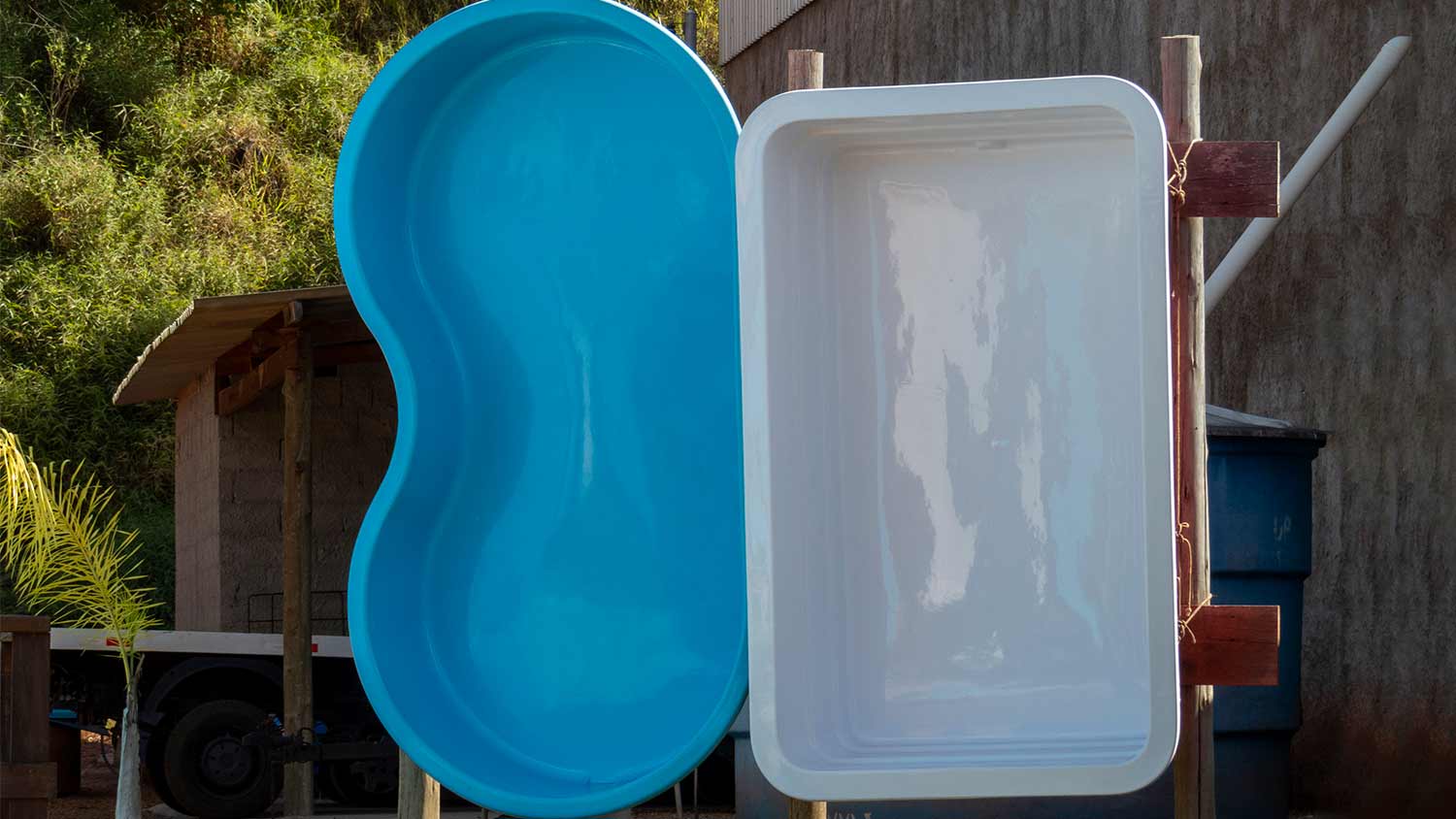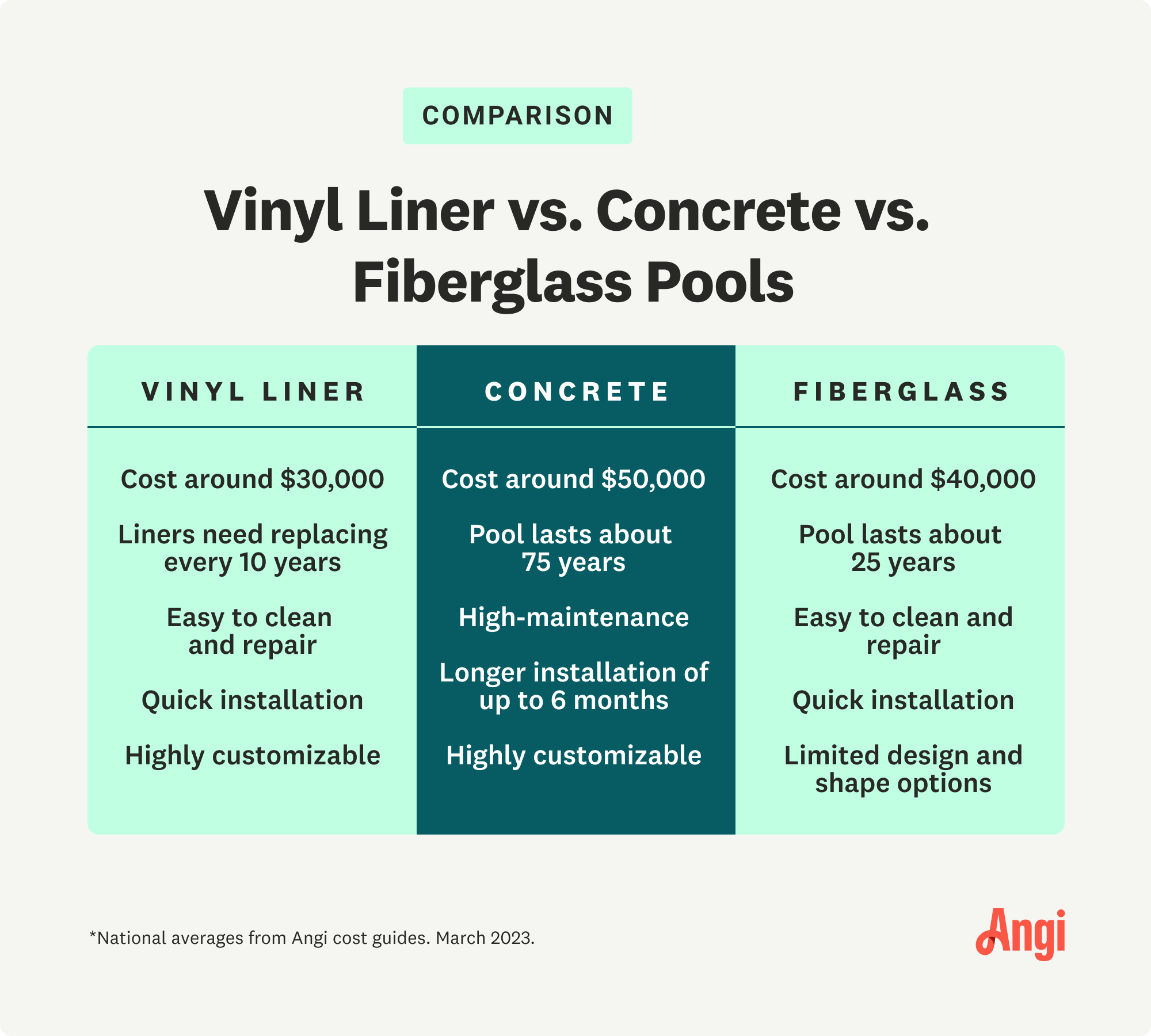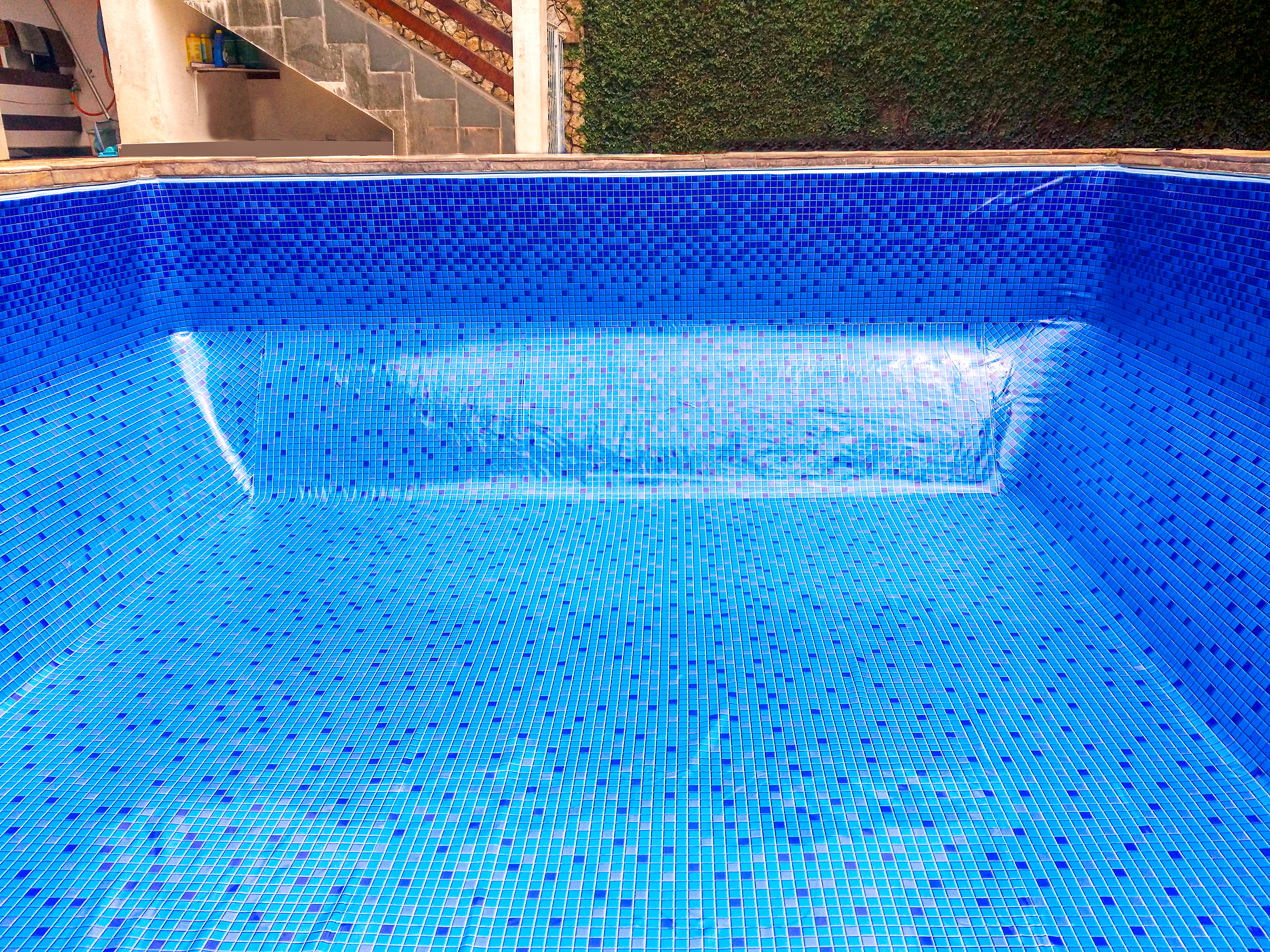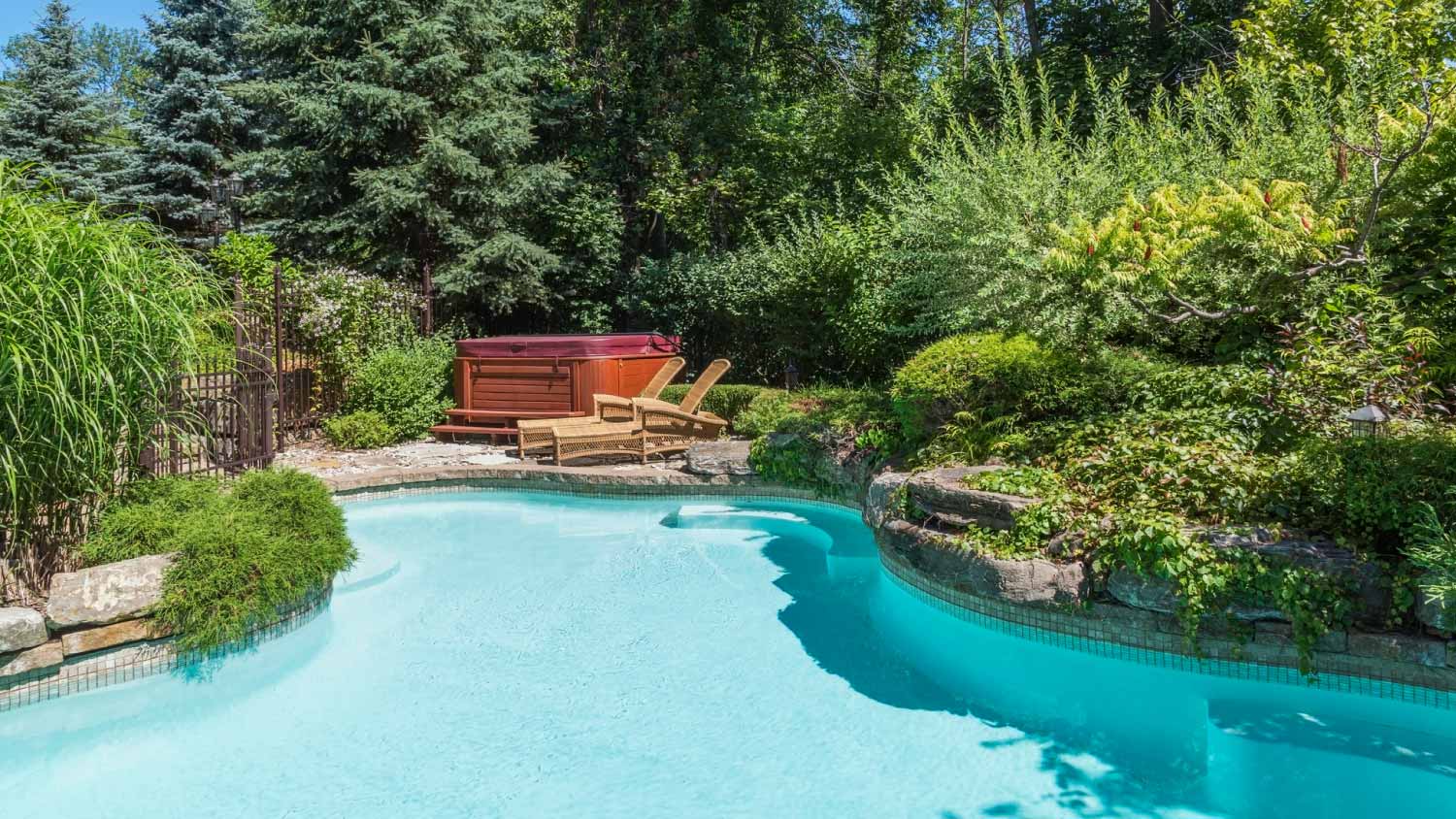
If you’ve been considering installing a new pool in the Buckeye State, this guide will help you understand inground pool costs in Columbus.
Your bare feet will thank you


Pool liners cover the sides and base of a swimming pool.
Liners make maintenance and cleaning easier.
Pool liners are important for swimmer safety.
Replacement liners cost $350 to $5,200.
For homeowners with pools or considering installing a pool, you may spend very little time thinking about the pool liner. With many pools, the liner is included in the total price. Maybe you take some time choosing from a few different designs, but otherwise, you don’t dive too deep into what the liner does or how important it is for a pool. So let's dive into the big question: what is a pool liner?
Whether you’re installing a pool for the first time or are due to replace your pool liner, learn more about this essential pool part, from the different types to its benefits and costs.
A pool liner is a waterproof lining or covering, typically made from vinyl, over the base of the pool. Liners help protect the pool structure, minimize algae growth, keep pool users safe from rubbing against rough or hot pool walls and floors, and add a finished look to the pool with simple or unique designs. When installing a pool, or replacing a liner, you’ll want to hire a local pool liner installation company to handle the job.
The pool, whether above ground or inground, has a frame or structure to create the shape of the pool. Then, the pool is constructed from wall panels, which may be made from sand, cement, steel, aluminum, polymer, or vermiculite, depending on if the pool is inground or above ground.
To keep the wall panels protected from chemically treated water and keep the pool users’ feet safe from touching hot metal or scratchy cement, a pool liner covers the walls. The liner will also cover the pool floor and steps and wrap around ladders and other pool accessories.

If you’re considering installing a pool liner, you’ll want to keep these pool liner benefits in mind. Not only do pool liners add a touch of style to your pool, but they can also be important for keeping swimmers safe. Plus, pool liners offer cost savings and low-maintenance benefits for homeowners.
One important benefit of a pool liner is that they help prevent pool leaks. These waterproof coverings can keep pool water confined, rather than seeping into porous wall panels or leaking out from the walls of an above ground pool.
Pool walls and floors may be made from porous substances, like sand or cement, or corrosive metals. The liner prevents the chemically treated water from making contact with the pool walls and floors. For porous walls and floors, water contact could allow algae to grow and quickly spread in the pool. For metal materials, the water could cause rust and corrosion.
Because vinyl shields porous wall panels from the water, you can spend less time scrubbing away algae growth. Vinyl liners are also non-porous and smooth, making them easy to clean. Pool liner repairs are pretty simple, too, requiring just a patch kit or some duct tape for small tears.
Scuffed feet, knees, or elbows can be a thing of the past when you install a pool liner, which is smoother than the rough texture of gunite pools. For pools with metal walls, the liner also protects swimmers from feeling the burn after the metal has been exposed to sunshine all afternoon.
Installing a pool with a vinyl liner is often less expensive upfront and quicker than constructing a concrete, gunite, or fiberglass swimming pool. Installing a pool costs about $30,000 for vinyl, $50,000 for concrete, $40,000 for fiberglass, and $100,000 for gunite. A vinyl liner pool may take only a few weeks to install, while a concrete pool can take up to six months.

Choosing the right pool liner can depend on your pool type and your personal preferences, as well as your budget.
There are three liner types to consider: overlap liners that drape over the top of the pool and are clamped into place, beaded liners that are attached to a track along the pool edge, or uni-bead liners that hook over the top of a swimming pool. Overlap liners are easy to install and the least expensive option, but they don’t offer the seamless look provided by uni-bead liners. Beaded liners make repairs and replacements easier compared to other pool liner types.
Many pool liners come in varying shades of blue. Lighter colors can offer a serene appearance, while darker blue hues can make the pool look deeper or more vivid. You may also opt for pool liners with patterns that mimic tile for a more unique look or stones for a natural appearance. You can even find liners with shining, iridescent finishes for a whimsical feel.
Thicker pool liners tend to be more durable and last longer than thinner liners, but they are also more expensive. If your swimming pool will get a lot of use, or maybe you live in an area with harsh weather, you may spend less over time by opting for a thicker pool liner.
You’re considering installing a pool in your backyard, but you aren’t sure whether to opt for a pool with a vinyl liner or other pool types, like concrete or fiberglass. There are pros and cons for each material.

Vinyl pools are one of the least expensive, costing around $30,000 for the pool, and the lowest maintenance options for pools, as they’re easy to clean. Some more perks of vinyl liners: installation is quick, and they’re highly customizable. However, you’ll need to pay to replace the liner about every 10 years.
Concrete pools cost more than vinyl, around $50,000, and take longer to construct—up to six months. But these pools are quite customizable and will last several decades. To extend its lifespan, you’ll need to keep up with frequent maintenance and care to prevent or repair cracks.
Fiberglass pools are in the middle in terms of price at around $40,000, and are easy to clean and maintain like vinyl pools. Fiberglass pools have a lifespan of about 25 years, making them slightly more durable than vinyl pools but not as long-lasting as concrete. They’re also relatively quick to install.

Installing or replacing a pool liner costs $350 to $5,200 on average, depending on the type and size of the pool. Above ground pool liners cost about $100 to $660, and inground pool liners cost around $700 to $1,500, plus labor costs of $250 to $2,500. You’ll spend more for larger pools, L-shaped or kidney-shaped pools, or for customized pool liner designs.
From average costs to expert advice, get all the answers you need to get your job done.

If you’ve been considering installing a new pool in the Buckeye State, this guide will help you understand inground pool costs in Columbus.

Is it time to treat yourself to backyard pool parties and late-night swims? Start with our guide, which answers the question: how much does it cost to build a pool?

The cost of pool liner replacement in Columbus depends on the size and shape of your pool, as well as the liner material and type. Here’s how the costs break down.

How much shock does my pool need? Here's how to calculate how much pool shock to add to your pool based on its overall water condition.

If your pool heater seems to be on the fritz, check out this guide to find out if you're better off with a repair or a pool heater replacement.

Swimming pool issues like algae or a clogged filter can happen to anyone. Learn more about common pool problems and how to fix them quickly and easily.